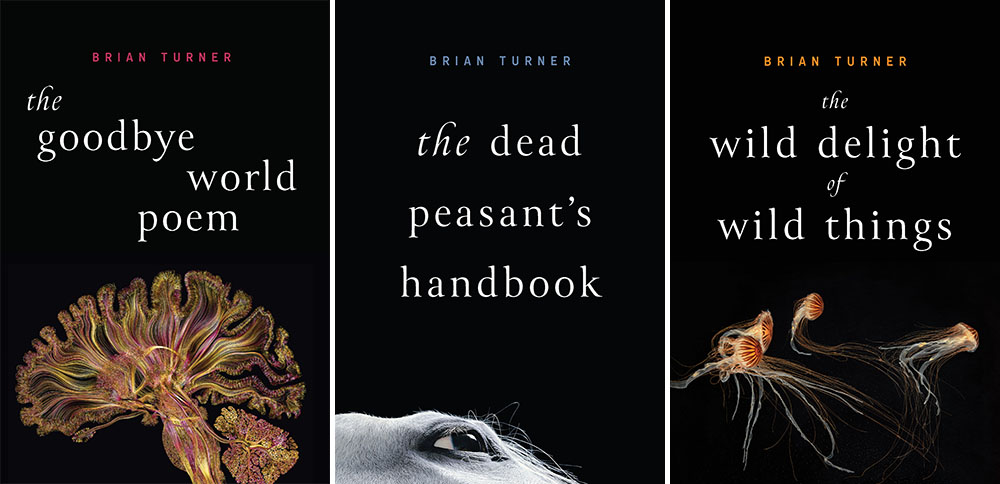Alice James has just published three new titles from the multiple-award winning author of Here, Bullet — The Goodbye World Poem, The Dead Peasant’s Handbook and The Wild Delight of Wild Things.
Brian Turner
3 Poems – from Three books
from The Goodbye World Poem
In This House of Flesh and Bone
There will be rain in the story.
A series of voices. Birds. Maybe
a character flaw some find charming.
There will be pain, of course,
and laughter. Some small
sweet gesture, like the way
she used to hold my face
in the tender cups of her palms
before kissing me, moments
that gather into something
one might call a life. This
story we tell ourselves
as loved ones cross over
one by one.
We are learning
how to care for the dead, each
in our own way. So, too, the living.
We lean our heads back and listen
to music translated from the air
as memory draws our fingers
through a loved one’s hair
before brushing the stone
to reveal the pooling shadows
of the chisel.
It’s something
like prayer, I think, the way others might
talk to god within the vaulted spaces
of the body, one’s voice spoken
into the long corridors swept clean
of shadow, there by the opened windows
where the birds might one day
fly in at dawn, singing.
from The Dead Peasant’s Handbook
The Bodies
The bodies lie along the shoulder of the road.
The bodies lie in an ambulance, a truck bed, a stretcher.
The bodies are strobed in flaring lights, color of fire, color of night.
The bodies rest within the fuselage of a plane at 36,000 feet.
The bodies contemplate silence as they wait in the morgue.
The bodies are moved from room to room, one hour to the next.
The bodies are bathed by strangers and by those who love them.
They are numbered and recorded with signatures and stamps.
They are forgotten by all save those who love them.
They are left to the fields, to the green embrace of earth.
They are given sunlight and storm, a shadow of wings descending.
They are given to rivers, to fire, to ash on the wind-driven rain.
They are carried on the shoulders of stone-faced men.
They are serenaded with tears, with the instruments of suffering.
They are eulogized in great halls and within the confines of loneliness.
They are lowered into the ground and into the vaults of memory.
They are disassembled and disbursed by the steady labor of time.
They learn more about compassion as they are lifted in someone’s arms.
They learn more about the sacred as voices call around them.
They learn more about grieving as their eyes are sewn shut.
The bodies are moved from room to room, one hour to the next.
The bodies are numbered and recorded with signatures and stamps.
The bodies are bathed by strangers and by those who love them.
The bodies contemplate silence as they await the mortician, and
they are forgotten by all save those who loved them.
from The Wild Delight of Wild Things
The Auditorium Cave
Bhimbetka, India
Archeologists often describe vast waves of time
as occupation layers, or horizons. In this particular cave,
we have to peel away layers of historical sediment
until we arrive at the Upper Acheulean Horizon, or
even deeper into the Lower Chopping Tool Horizon.
Once we’ve traveled far enough, the excavation reveals
cupules—rounded indentations in the interior of the cave.
They are rock markings pounded into crystallized quartzite.
Imagine what it would take to create any one of them.
The sheer number of blows. A hammerstone held in the palm
and pounded against the wall of the cave, over and over,
with precision. And while some might call it art,
or a message to the gods of thunder to pour any rain
they might hold within the ever-changing bodies they cloud
across the sky, I think it might have been the pounding
of one’s sorrow into the wall of the mountain they lived in.
A hammerstone swung against all that is resolute.
Each report sounding itself deep into the mountain.
Percussion petroglyphs. Forged within the cold
and indifferent. The stone altered by it.
Made to embrace its own silence.
As it often happens. We recognize absence by what holds it.
And how could this not be considered art? Painful
though it may have been to create. Pounded
into the mountain 290,000 to 700,000 years ago.
The sound of it ringing throughout the cave, even still.
•
I’m reminded of our home in College Park.
Built in 1949, I doubt it will see the year 2100.
At some point, it’ll be torn down in a matter of hours,
its footprint cast over in concrete for a another
housing generations to come. None of them
will have the slightest clue that we lived here.
That we even existed. In their busy lives,
they likely won’t pause to consider what once was.
The two of us dancing in the kitchen. Spinning vinyl
until dawn. Crying in each other’s arms. Laughing.
That floating in the dark we did in bed, drifting
hour by hour through wavelengths of being.
And these new people, those who come after—
I imagine them in bed at 2 a.m., in a room
a few stories above our own. One of them listens,
breathless for a time, then gently wakes the other,
as you used to do sometimes, leaning in
close, whispering—Do you hear that?





I loved reading this in my tonight’s sleepless hour. This new body of words is so alive and vivid to me just now—an imaginative realm drawn out of the entire world answering the question in a poem to Vice Prefect Chang: “Have you construed the poles of being?
Wow. I feel every inch of these poems.